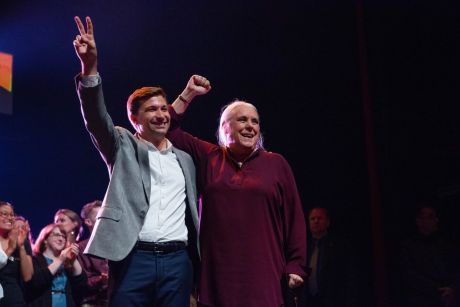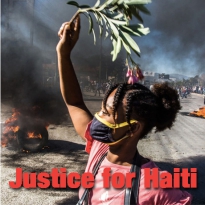News
You are here
Breakthrough for Quebec Solidaire

October 2, 2018
The two parties that have traded power in Quebec for generations, the Liberals and the Parti Quebecois, were both kicked to the kerb in the October 1st election.
The Liberals crashed from a 70 seat majority to 32 seats (the worst showing since 1975). Their share of the vote fell from 41.5% to about 25%, a catastrophic collapse. Never since Confederation have the Liberals taken less than 30% of the vote. They ran on their economic record – which proved to be a mistake. Their neo-liberal economic policies of austerity certainly didn’t appeal to working Quebecois.
And the Parti Quebecois collapsed from 30 seats to 9, with a fall from 25.4% of the vote to about 17%. That means a loss of official party status. To make matters worse for the PQ their leader Jean-Francois Lisée lost his own seat in Rosemont to Québec Solidaire candidate Vincent Marissal.
Quebec voted overwhelmingly for change. It is unfortunate that most of that sentiment went to the conservative Coalition Avenir Québec (CAQ), but it would be a mistake to underestimate the breakthrough of Québec Solidaire, from 3 seats all on Montreal Island, to 10. This includes two seats in Québec City, one in Sherbrooke and one in Rouyn-Noranda-Témiscamingue.
As Manon Massé, co-leader of QS stated in her victory speech, “Québec solidaire is not just a party of the Plateau of Montreal.”
QS managed to get almost 650,000 votes and increased their vote percentage from 7 to 16%. In some places, the QS victory was not even close. Catherine Dorion, won the riding of Taschereau in Québec City by more than 8,500 votes over her nearest rival from the CAQ.
This is a dramatic change for QS and for the left in Québec. An explicitly and unapologetically left platform has yielded significant results. They were mercilessly attacked over the last weeks of the race. There was both a campaign of red-baiting and a full court press by many big name PQ luminaries and former sovereigntist leaders to denounce the party. The English media painted QS as a dangerous party and almost exclusively focused on the question of sovereignty rather than discuss the rest of their platform.
Jesse Greener, a QS activist in Quebec City, pointed out that attempts to smear QS backfired. “The attacks by Lisée and the PQ about QS being Marxist did not affect QS. It might have made QS stronger. Lisée himself was defeated by a QS candidate.”
“The old political class is bringing out the heavy artillery,” Manon Massé told the media. “They attack, they threaten, (they bring up) Marxism.” She said – somewhat tongue-in-cheek – that if getting serious about climate change was socialism, she was a socialist; if putting people’s lives first was Marxism, she was a Marxist.
How did QS break through? According to Benoit Renaud, candidate for QS in Hull, “By putting forward proposals that were concrete and specific that resonated with ordinary people, we managed to reach people who want real change.”
Taking on CAQ
The CAQ victory will, no doubt, result in more austerity and a further emboldening of the far right. But having a mass organized fighting left force to challenge them puts the situation in Quebec far ahead of where the left is in most parts of the country.
Monique Moisan, who participated in the founding of QS, said, “It is a good thing we began building 15 years ago. We knew a rightward wind was blowing across the country.”
QS has always been a different type of party, explicitly campaigning not just during elections but in the years between. It is a party of both the ballot box and the street. How will they respond to the CAQ challenge? Benoit Renaud went on to say that for the next steps, QS will, “organize people in the workplace and in the street, because it’s great to elect people to the National Assembly, but we need to continue between elections.” As Catherine Dorion told supporters on election night, “Stay mobilized!”
Shifting the debate
Over the course of the campaign QS was able to shift the entire discussion to the left and forced the other parties to retreat from some of their more hard right policies. On the question of climate change for example, the QS platform was clear from the beginning.
At mid-campaign QS unveiled its detailed green transition plan, towards a complete break with fossil fuels and electrification of both public and private transit. Highway development would be ended, 38 new subway stations in the Montreal region would be initiated, and 300,000 green jobs would be created by investment in public transit and by nationalizing lithium mines to develop battery production, reuse and recycling.
The goal is to diminish carbon emissions by 48% from 1990 levels by 2030, and by 95% by 2050. In order to achieve this, QS would put in place $19.4 billion in a first mandate and 73 billion between now and 2030.
This forced the other parties to respond to the QS platform. In the immediate aftermath of the tornados in Ottawa and Gatineau, all the party leaders went to the storm ravaged region to look at the damage. The storm had put the question of climate change front and centre and the other three parties had to try and match the ambitious program that QS put forward. The CAQ, which had been talking about support for fracking suddenly stopped mentioning that and tried to put their own energy policy on the back burner.
On other economic issues QS also shifted the debate. They put out an online financial tool to calculate how much better off the average person would be under QS policies—which include public dental insurance, free education through to doctorate, half-price public transit, and an immediate raise of the minimum wage from $12 to $15, and 4 weeks of vacation to all workers employed after 2 years. All of this is costed and paid for by a QS proposal to tax corporations and high-income earners, and to find savings in areas that currently favour the economic elite.
Historic breakthrough
Nora Loreto, a QS activist in Quebec City, told Socialist Worker the election was an, “Historic breakthrough… Quebec solidaire didn’t just go from 3 to 10 [seats], though it did, but we proved that an audacious campaign can also be popular. We lead in the polls among one-third of voters: 18-34 and the win of five women and five men [MLAs] is just an electoral start. We can defeat the CAQ in the streets and our show of force outside of Montreal will be what tones down and ultimately defeats Legault.”
The youth vote was crucial for QS. This is the generation of the Maple Spring, who fought and won against rising tuition and in the process unleashed a movement that touched every part of Quebec society. As co-spokesperson Manon Massé said in her speech, “A new generation is starting to find its place, a generation that is tired of having its future mortgaged. It has not known the cynicism of bitter defeats, it is prepared to pick up the torch. It is time to make room for them.”
With a CAQ majority, the October 7 antiracism demo takes on a new urgency. François Legault tried to fuel anti-immigrant sentiment in the campaign. The movement on the ground will be critical to fighting back as the CAQ pushes divide and conquer policies.
QS is now the real opposition
As the traditional parties descend into leadership races and internal discussions about what went wrong, QS will find itself asking a better question: what went right?
And what does it mean to be a party of the streets between elections in the face of a right of centre government and heightened divide and conquer strategies?
QS has to transform the effective election machine it built into a machine for social struggle, that harnesses that same energy against every retrograde thing the CAQ tries.
Because QS is now the REAL opposition, both in Parliament and in the streets, and everyone who voted QS was elected to that opposition. The fight with the CAQ starts now.
Section:
Topics:










